- Home
- Cherie Priest
Ganymede (Clockwork Century) Page 2
Ganymede (Clockwork Century) Read online
Page 2
“Evening, ma’am!” he said cheerfully. He was always cheerful. Suspiciously so, if you wanted Josephine’s opinion on the matter, but Fenn was so well liked that no one ever did.
With her usual polite formality, she replied, “Good evening to you, Mr. Calais. I see you’re being properly cared for. Is there anything I can get you, or anything further you require?”
Caroline flashed Josephine a serious look and a sharpened eyebrow. This was combined with a quick toss of her head and a laugh. “We’ll keep an eye on him, Miss Josephine,” she said lightly, but the urgent, somber gleam in her eyes didn’t soften.
Josephine understood. She nodded. “Very well, then.” She smiled and stepped aside, letting the three of them pass. When they were gone, she turned her attention to the far end of the corridor. Caroline and Delphine had been luring Fenn Calais away from something.
From someone.
She could guess, even before she saw the window that hadn’t been fully shut, and the swamp-mud scuff of a large man’s shoe across the carpet runner.
With a glance over her shoulder to make sure the Texian was out of hearing range, she called softly, “Deaderick? That’d damned well better be you.”
“It’s me,” he whispered back. He leaned out from the stairwell. “That Fenn fellow was passed out on the settee with a drink in his hand. I thought I could sneak past without waking him up, but he sleeps lighter than he looks.”
She exhaled, relieved. She wedged Little Russia into her skirt pocket. “Delphine and Carrie took care of him.”
“Yeah, I saw.” He looked back and forth down the hall. Seeing no one but his sister, he relaxed enough to leave his hiding place.
Deaderick Early was a tall man, and lean like his sister, though darker in complexion. They had only a mother in common, and Deaderick was several shades away from Josephine’s paler skin. His hair was thick and dense, and black as ink. He let it grow into long locks that dangled below his ears.
“You’re lucky it was only Fenn. He’s easily distracted and probably too drunk to recognize you.”
“Still, I didn’t mean to take the chance.”
She sighed and rubbed at her forehead, then leaned back against the wall and eyed him tiredly. “What are you doing here, Rick? You know I don’t like it when you come to town. I worry about you.”
“You don’t worry about me living camped in a swamp?”
“In the swamp you’re armed, and with your men. Here you’re alone, and you’re visible. Anyone could see you, point you out, and have you taken away.” She blinked back the dampness that filled her eyes. “With every chance you take, the odds stack higher against you.”
“That may be, but we need soap, salt, and coffee. For that matter, a little rum would make me a popular man, and we could stand to have a better doctor’s kit,” he added, looking down at an ugly swath of inflamed skin on his arm—caused, no doubt, by the stinging things that buzzed in the bayou. “But also, I came to bring you this.”
From the back pocket of his pants, he produced an envelope that had been sealed and folded in half. “It might help your pilot, if you ever find one.”
“What is it?”
“Schematics from a footlocker at the Pontchartrain base. It’s got Hunley’s writing on it. I think it’s a sketch for the steering mechanism, and part of the propulsion system. Or that’s what Chester and Honeyfolk said, and I’m prepared to take their word for it.”
“Neither one of them needs it?” She slipped the envelope down into her cleavage, past her underwear’s stays.
“They’ve already taken that section apart and put it all back together. It doesn’t hold any secrets for an engineer, but a pilot who wants to know what he’s getting himself into … this might come in handy. Or it might not, if you have to trick someone into taking the job.”
A loud cough of laughter came from upstairs, and the whump of heavy footsteps. The siblings looked up to the ceiling, as if it could tell them anything; but Josephine said, “Fenn again, heading to the water closet. Listen, we should go outside. Out back it’s quiet, and even if someone sees you, it’ll be too dark for anyone to recognize you.”
“Fine, if that’s what you want.” He pushed the back stairway door open and held it for her, letting her lead the way.
Down they went, her soft, quiet house slippers making no noise at all, and his dirty leather boots trailing a muffled drumbeat in her wake. At the bottom, she unlocked the back door and pushed it. It moaned on its hinges, scraping trash and mud with its bottom edge.
It opened, letting them both outside into the night.
The alley itself was dark and wet, smelling of vomit, urine, and horse manure. Overhead the moon hung low and very white, but they barely noticed it over the grumbling music, swearing sailors, drunken planters, and the late-night calls of newspaper boys trawling for pennies before closing up shop. The gas lamps on Rue des Ursulines gave the whole night a ghostly wash, leaving the shadows sharp and black between the lacy Old World buildings of the Vieux Carré, and leaving Josephine and Deaderick as close to alone as they could expect to find themselves.
Josephine swatted at her brother’s vest pocket, the place where he always kept tobacco and papers. He took the hint, retrieved his pouch, and began to roll two cigarettes between his fingers. “It’s a good thing that dumb bastard let himself be dragged away so easy.”
“Like I said, you were lucky. Some of the younger men lounge around armed, and after a few drinks, they’re quick to draw. Fenn’s not dumb, but he’s harmless. Even if he’d seen you—even if he’d recognized you—we might’ve been able to buy him off.”
“You’d trust some old Texian?”
“That one?” Josephine took the cigarette he offered and waited for him to light it. She gently sucked it to life, and the smell of tobacco wafted up her nose, down her throat. It took the edge off the mulchy odor of the alley. “Maybe. I don’t think he’d make any trouble for us. He’d die of sorrow if we told him he wasn’t welcome anymore.”
Deaderick lit his own cigarette and stepped onto a higher corner of the curb, dodging a rivulet of running gutter water. “You making friends with Republicans now? Next thing I hear, you’ll be cozying up to the Rebs.”
“You shut your mouth,” she whispered hard. “All I’m telling you is that Fenn spends more time at the Court than he does at his own home, assuming he has one. He’s sweet on Delphine and Ruthie in particular, and he won’t go talking if he thinks we’ll keep him from coming back.”
“If you say so.” He sighed and asked quietly, “Any chance you heard from that pilot friend of yours? The man from Georgia—could you talk him into it?”
“He can’t make it, so now I’ve got to find someone else. I’m working on it, all right? I’ve already talked to Marylin, and tomorrow she’ll take Ruthie over to the airyard to look around.”
“There’s nothing but Republicans and Rebs down at the airyard. You’d have better luck in Barataria. Not that I’m suggesting it.”
She snorted, and a puff of smoke coiled out her nostril. “Don’t think I haven’t considered it. But I want to check the straight docks first, all the same. Times are hard all over. We might find foreigners—or maybe Westerners—desperate enough to take the job.”
“How much money you offering?”
“Not enough. But between me and the girls, we might be able to negotiate. There’s always wiggle room. I’ve talked it over with those who can be trusted, and they’re game as me to pool our resources.”
“I don’t want to hear about that,” Deaderick said stiffly.
“I suppose you don’t, but that doesn’t change anything. If we can get this done between us, it’ll all be worth it. Every bit of it, even the unpleasant parts. We’re all making sacrifices, Rick. Don’t act like it’s a walk in the park for you and the boys, because I know it isn’t.”
Life was hard outside the city, in the swamps where the guerrillas lurked, and poached, and picked off Confederates
and Texians whenever they could. It was written all over her brother’s flesh, in the insect bites and scrapes of thorns. The story was told in the rips that had been patched and repatched on his homespun pants, and in the linen shirt with its round wood buttons—none of which matched.
But she was proud of him, desperately so. And she was made all the prouder just by looking at him and knowing that they were all struggling, certainly—but her little brother, fully ten years her junior, was in charge of a thirty-man company, and quietly paid by the Union besides. He drew a real salary in Federal silver, every three months like clockwork. Out of sight, at the edge of civilization, he was fighting for them all—for her, for the colored girls at the Garden Court, and for the Union, which would be whole again, one of these days.
And just like her, he was fighting for New Orleans, which deserved better than to have Texas squat upon it with its guns, soldiers, and Confederate allegiance.
Deaderick gazed at his sister over the tiny red coal of his smoldering cigarette. “It can’t go on like this much longer. These … these—” He gestured at the alley’s entrance, where a large Texian machine was gargling, grumbling, and rolling, its lone star insignia visible as it shuddered past, and was gone. “—vermin. I want them out of my city.”
“Most of them want out just as bad.”
“Well, then, that’s one thing we got in common. But I don’t know why you have to run around defending them.”
“Who’s defending them? All I said in behalf of Fenn Calais is that he’s an old whoremonger with no place left to hang his hat. I have a business to run, that’s all—and I don’t get to pick my customers. Besides, the better the brown boys like us, the safer I stay,” she insisted, using the Quarter’s favorite ironic slang for the soldiers who, despite their dun-colored uniforms, were as white as sugar down to the last man. “I can’t have their officers sniffing around, looking too close. Not while I’m courting the admiral, and not while you’re running the bayou. As long as we keep them quiet and happy, they leave us alone.”
“Except for the ones you treat to room and board,” he sniffed. “You let that old fat one get too close. You call him harmless, but maybe he thinks like you do. Maybe he watches you send telegrams, or pass messages to me or Chester. Maybe he sees a scrap of paper in the trash, or overhears us talking some night. Then you’ll sure as hell find out how far you can trust your resident Texian, won’t you?”
It was something she’d privately wondered about sometimes, upon catching a glimpse of Fenn Calais’s familiar form sauntering through the halls with Delphine, Ruthie, or a new girl hanging on his arm … or drinking himself into a charmingly dignified stupor in one of the tower lounges. Occasionally it occurred to her that he could well be a spy, sent to watch her and the ladies. Spies were a fact of life in New Orleans, after all—spies of every breed, background, quality, and style. The Republic of Texas had a few, though as an occupying force, they were all of them spies by default; the Confederacy kept a number on hand, to keep an eye on the Texians who were keeping an eye on things; and even the Union managed to plant a few here and there, keeping an eye on everyone else.
As Josephine would well know. She was on their payroll, too.
She dropped the last of her cigarette before it could burn her fingers, and she crushed its ashes underfoot on street stones that were slippery with humidity and the afternoon’s rain. Her house slippers weren’t made for outdoor excursions of even the briefest sort, and they’d never be the same again—she could sense it. Between her toes she felt the creeping damp of street water and regurgitated bourbon, runny horse droppings strung together with wads of brittle grass, and the warm, unholy squish of God-knew-what, which smelled like grave dirt and death.
“I don’t like it out here,” she said by way of changing the subject. “And I don’t like you being here. Go home, Rick. Go back to the bayou, where you’re safe.”
“It’s been good to see you, too.”
“Just … stay away from the river, will you?”
“I always do.”
“Promise me, please?”
Down by the river and roaming the Quarter’s darker corners, monstrous things waited, and were hungry. Or so the stories went.
“I promise. Even though I’m not afraid of a few dusters.”
“I know you’re not, but I am. I’ve seen them.”
“So have I,” he declared flippantly, which meant he was lying. He’d only heard about them.
“They aren’t dusters,” she muttered.
“Sure they are. Addicts gone feral, like cats. And you worry too much.”
She almost accused him of lying, but decided against starting that particular fight. If anything, it was good that he was ignorant of the dead—or that’s what she told herself. She’d be thrilled if he went his whole life without ever seeing one, even though it meant that he wrote them off as bedtime stories, designed to frighten naughty children.
He last lived in the Quarter ten years ago, before he’d headed off to fight. Back then, there hadn’t been so many of them.
Deaderick didn’t want to argue any more than Josephine did. “I’ll stay away from the river, if it’ll make you happy. And maybe I’ll head out to Barataria myself, one of these days soon. We hit them up for discreet mechanics and supply fliers every now and again. While I’m there, I’ll see if I can’t spot any potential pilots for you.”
“All right, but if you find anyone, be careful what you tell him. It’s dangerous work we’re asking for, but anybody we have to trick too badly won’t do us any good, when push comes to shove. That’s why I’m sending another few telegrams tonight. I’ve got somebody else in mind.”
“You do?”
“I know of a man who might be good for the task. If I can find him. And if he’s still alive. And if he can be persuaded to come within fifty feet of me.”
Deaderick grinned at her. “Sounds promising.”
“It’s not promising, but it’s better than nothing. We have to get that thing out of the lake. We have to get it out to sea, to the Federal Navy. Once they get a crack at it, it’s just a matter of time. Ganymede could change everything.”
“I know,” her brother said, putting his arms around her. “And it will.”
In the distance, a cheer went up and so did a small flare—a little rocket of a thing that cast a pink white trail of burning fire into the sky. A second cheer followed it, and the clapping of a crowd.
“Goddamn Texians,” Josephine said wearily, the words garbled against his shoulder.
“What are they doing?”
“Tearing up the cathedral square, gambling on livestock, and shooting off fireworks. It isn’t right.”
Deaderick nodded, but noted, “You haven’t been to church in half a lifetime.”
“Still,” she said, “that doesn’t make it right, what they’re doing over there.”
A faintly burning chemical stink joined the city’s odors, trapped in the humid fog of Gulf water and river water that crept through the Quarter like a warm, wet bath. Gunpowder and animals, men and women, alcohols sweet and sour—bourbons brought from Kentucky, whiskeys imported from Tennessee, rums shipped in from the islands south of Florida, and grain distillations made in a neighbor’s cast-iron tub. The night smelled of gun oil and saddles, and the jasmine colognes of the night ladies, or the violets and azaleas that hung from balconies in baskets; of berry liqueur and the verdant, herbal tang of absinthe delivered from crystal decanters, and the dried chilies hanging in the stalls of the French market, and powdered sugar and chicory.
Josephine leaned her head on Deaderick’s shoulder as she hugged him good-bye. She breathed, “We’re drowning like this, you know,” and she saw him off with tears swallowed hard in the back of her throat.
Two
Andan Cly folded the telegram shut and said, “I’ll be damned.” He slipped it into his shirt pocket, then changed his mind and set it instead on the bar—as if he were reluctant to touch it, but did
n’t want to let it out of his sight.
“What for?” Angeline drew her feet up onto the stool’s bottommost rung and looked at him expectantly. She was dressed in her usual preferred attire, a man’s shirt and pants cut down to size. A slouch-rim hat sat atop her head, crowning the long gray braid that hung down her back.
The pilot and sometimes-pirate cleared his throat and signaled the bartender for a glass of something stronger than what was already in front of him. “It’s … it’s a message. From someone I used to know, a long time ago.”
“Must be a woman.”
“I didn’t say it was a woman.”
“If it wasn’t, you wouldn’t be hemming and hawing like a schoolboy.”
“Hush, you,” he told her, not for a moment expecting her to do so.
Lucy O’Gunning slipped a shot in front of him and then put a bottle of whiskey beside it. “One for you, too, Princess?”
“Since you’re offering.”
Lucy poured another drink, using her one mechanical arm as deftly as any bartender ever used two of the usual kind. “And what have we got here?” She reached to pick up the cheap slip of transcription paper, but Cly snatched it back, crumpling it in his hand.
“It’s a note from a woman,” Angeline informed her. “He won’t admit it, but that’s what it is. Telegram came up from Tacoma. Freddy Miller brought it in his sack with the last batch of mail; I just brought it along, ’cause I was passing through anyhow.”
“A woman?” Lucy gave Andan Cly a suspicious squint. “You airmen, all the same. A girl in every port.”
“It ain’t like that,” he insisted. “I haven’t seen this woman in … I don’t know. Eight or ten years. She’s a few thousand miles away, and she didn’t dash off a note because she missed me.” Under his breath he added, “I can promise you that.”
“Ooh.” Lucy leaned forward, planting her matronly bosom on the countertop and propping her chin in her clockwork palm. “Sounds interesting.”

 Maplecroft
Maplecroft Chapelwood
Chapelwood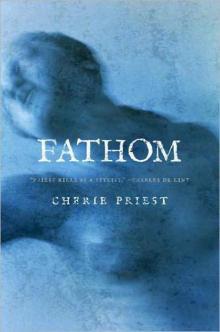 Fathom
Fathom Hellbent
Hellbent Jacaranda
Jacaranda Four and Twenty Blackbirds
Four and Twenty Blackbirds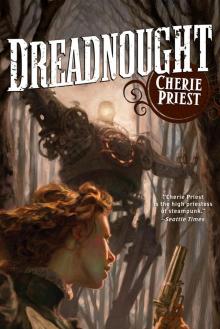 Dreadnought
Dreadnought Dreadful Skin
Dreadful Skin Bloodshot
Bloodshot Tanglefoot
Tanglefoot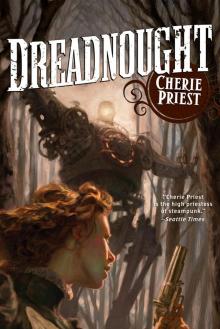 Clementine
Clementine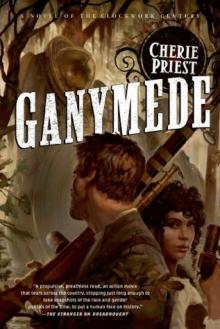 Ganymede
Ganymede The Inexplicables
The Inexplicables Not Flesh Nor Feathers
Not Flesh Nor Feathers Wings to the Kingdom
Wings to the Kingdom Fiddlehead
Fiddlehead Tanglefoot: A Story of the Clockwork Century
Tanglefoot: A Story of the Clockwork Century The Agony House
The Agony House Ganymede (Clockwork Century)
Ganymede (Clockwork Century) The Inexplicables (Clockwork Century)
The Inexplicables (Clockwork Century)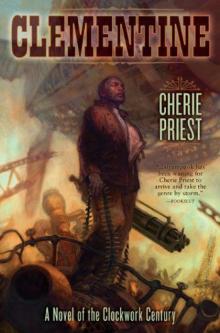 Clementine tcc-2
Clementine tcc-2 Grants Pass
Grants Pass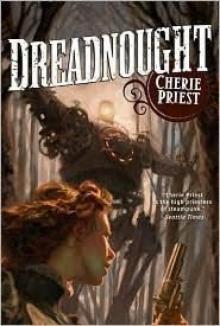 Dreadnought tcc-3
Dreadnought tcc-3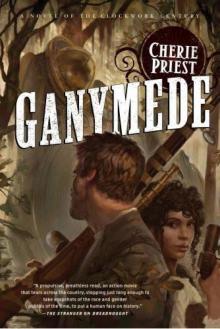 Ganymede tcc-4
Ganymede tcc-4